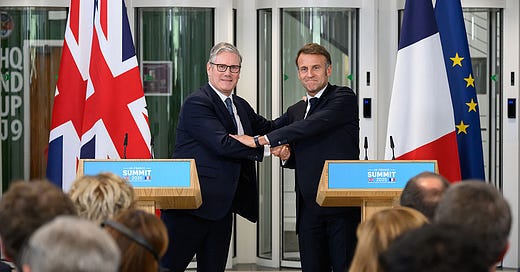Of the various agreements signed during President Macron’s state visit to London, the Prime Minister has been inclined to stress the one on the return of migrants, as that is the one most likely to help with his immediate domestic political problems. Because of this less attention has been given to the agreement on nuclear cooperation, despite the two leaders describing it as ‘historic’. The Northwood Declaration, as it is now known, stated that:
‘Our nuclear weapons exist to deter the most extreme threats to the security of our nations and our vital interests. Our nuclear forces are independent, but can be coordinated and contribute significantly to the overall security of the Alliance, and to the peace and stability of the Euro Atlantic area.
‘As we have explicitly stated since 1995, we do not see situations arising in which the vital interests of either France or the United Kingdom could be threatened without the vital interest of the other also being threatened. France and the United Kingdom agree that there is no extreme threat to Europe that would not prompt a response by our two nations.
‘France and the United Kingdom have therefore decided to deepen their nuclear cooperation and coordination. A UK-France Nuclear Steering Group will be established to provide political direction for this work. It will be led by the Presidency of the French Republic and the Cabinet Office and will coordinate across nuclear policy, capabilities and operations.’
Exactly what the coordination of the respective deterrents might mean in practice is less clear. It could involve optimizing the number of missile-carrying submarines (SSBNs) on patrol at any time, agreeing where to patrol, sharing intelligence on Russian anti-submarine activities, or even allocating targets. It is essentially about asserting their shared strategic interests and maximizing the deterrent effect of two forces that may improve in quality as they are modernised but are not going to get much larger.
No mention was made of Donald Trump in Macron and Starmer’s joint press conference, but it seems likely that uncertainties surrounding the US President’s commitment to NATO encouraged this announcement. Macron also emphasised that it was not about Ukraine. The two leaders had agreed to keep working on a ‘coalition of the willing’ to provide security guarantees to Ukraine if and when a peace deal is agreed with Russia, so one interpretation might have been that this was intended to reinforce the nuclear part of any guarantee.
These short-term influences were clearly present, even if the agreement is for the long-term. In the briefing surrounding the statement it was linked to the challenging security situation faced at the moment. In his speech to parliament on 8 July Macron stated that:
‘There is an expectation in Europe that, faced with revisionist neighbours, our two countries have a special responsibility for the security of the continent. And it is time to articulate it.’
The Northwood Declaration is the latest stage in a deepening of British and French nuclear cooperation that goes back to 1995, but the timing also reflects the security needs of the moment. In the rest of this post, I’ll start by looking at that history, and the current government’s thinking on nuclear strategy. And then at how Trump’s actions are changing European thinking, especially in the light of Ukraine.
Keep reading with a 7-day free trial
Subscribe to Comment is Freed to keep reading this post and get 7 days of free access to the full post archives.




